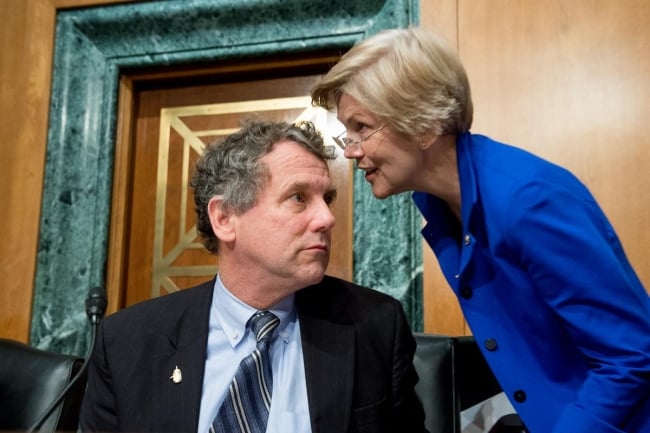You have /5 articles left.
Sign up for a free account or log in.

Senators Sherrod Brown and Elizabeth Warren are digging into the business practices of online program managers.
Getty Images/The Washington Post/Contributor
Questions about the legality of colleges sharing tuition dollars with companies that help them recruit students are not new, but until recently, lawmakers weren't asking them.
On a recent afternoon when President Trump’s impeachment inquiry was grabbing attention in Washington, that changed.
In Jan. 23 letters to the CEOs of five leading online program management companies, Senators Elizabeth Warren and Sherrod Brown questioned the legality of the business practices of 2U, Academic Partnerships, Bisk Education, Pearson Learning and Wiley Education Services.
The senators requested copies of all contracts the OPM companies hold with colleges, as well as sample presentation materials and details of expenditures and revenue. The companies were asked to provide the information by Feb. 21.
“As the influence of this small handful of companies on the American higher education system has exploded, there is an increasing need for transparency to ensure that students and policy-makers are able to make informed decisions,” wrote the senators in their letters.
“It is also critical that policy-makers determine if OPM business practices -- specifically OPM contracts that require tuition-sharing arrangements -- are legal, an appropriate use of federal student aid dollars, and in the best interest of students,” they continued.
The criticisms are not new. Robert Shireman, senior fellow at the Century Foundation and a former Education Department official during the Obama administration, wrote about the “sketchy” legal basis for the revenue-share OPM business model for Inside Higher Ed last October. Shireman’s article and research conducted by his colleagues at the Century Foundation are heavily cited in the senators’ letters.
What is new is the high level of attention from reform-minded senators, one of whom is seeking the Democratic nomination for president. It set off discussion among industry experts about how much might change and how significant the attention will be. And since OPMs offer important services and sometimes up-front investment to colleges and universities seeking to grow online, it could prove to be an important development across higher education.
The legal question centers around potential violations of the incentive-compensation rule. This rule, which applies to higher education institutions in receipt of federal student aid, prevents admissions staff members from being compensated based on their success recruiting students. Because tuition-sharing deals often involve delegating recruitment responsibilities to OPMs, Shireman argues they may create an incentive structure that violates federal law. Warren and Brown picked up that argument in their letters.
OPM companies, however, cite 2011 guidance from the Department of Education that allows for bundled-service contracts to illustrate they are not in violation of the law.
The senators said it is “not clear whether this non-regulatory guidance is consistent with the text of the Higher Education Act.” Shireman said he would like to see the department guidance revoked.
“The language in the Higher Education Act regarding incentive compensation is clear,” said Shireman. “I’m not sure anything needs to be changed or amended, other than perhaps adding, ‘we really mean it.’”
Many OPM companies are already moving away from offering tuition-sharing deals in favor of hybrid or fee-for-service arrangements, noted Shireman. He predicts that increased political scrutiny of revenue-sharing arrangements will simply speed up this process. If revenue-sharing arrangements linked to student recruitment are found to violate the incentive-compensation ban, institutions may be required to renegotiate their contracts, he said.
“I think many institutions would actually welcome the opportunity to renegotiate their contracts,” he said. “They might get a better deal.”
Old Criticisms
Some criticisms of the OPM business model in the senators’ letters echoed those historically leveled against the for-profit industry, specifically the concern that tuition-sharing arrangements in OPM contracts create perverse incentives and lead to aggressive and deceptive recruiting practices.
For example, the senators said prospective students may not receive information about the program, its cost or admissions policies until after they provide their contact information, which is used to barrage them with texts and calls. They also suggested that OPM companies may have driven up prices for some students.
Jeff Silber, a senior analyst at BMO Capital Markets, wrote to his subscribers on Jan. 24 that many of the criticisms expressed in the senators' letters had been aired before. Though 2U stock briefly dipped in value following the news, it has now recovered. Silber noted that education stocks “typically initially overreact to negative political headlines.”
Though the OPM companies are not legally required to supply the information requested by Warren and Brown, three of the five companies told Inside Higher Ed that they intend to respond. Representatives at Bisk Education and Academic Partnerships did not respond to requests for comment.
Todd Zipper, president of Wiley Education Services, said via email that the senators’ letters represent an “opportunity to spotlight the critical work of our university partners in improving access and outcomes for students and working professionals.”
"We welcome dialogue that advances our collective mission to close the skills gap and create more pathways to opportunity," he added. "This is an all-hands-on-deck effort, including private sector partners."
A spokesperson for 2U highlighted the company’s “willingness to stand behind the quality and strong student outcomes of the programs we power.” The company launched a transparency framework last year and plans to release its inaugural transparency report this year.
A spokesperson for Pearson Learning said that online degree programs are “helping thousands of students achieve their education and career goals,” noting that online programs “can require a significant up-front investment that is unrealistic for institutions to undertake alone.” The spokesperson added, “Pearson’s online program management model depends on the success of students, not the recruitment of students.”
Josh Kim, director of online programs and strategy at the Dartmouth Center for the Advancement of Learning and a blogger for Inside Higher Ed, said he hoped the senators’ letters would result in a meaningful dialogue between lawmakers, institutions and OPM companies.
"These senators are raising important issues that are not going to go away," Kim said. "It would be the wrong thing to do to try and ignore this. The OPMs should engage as openly as possible and try and acknowledge the concerns."
The scrutiny of revenue-sharing arrangements shouldn’t cause university leaders to panic, Kim said. There has always been scrutiny of for-profit companies' role in higher education, and this letter is “just a reflection of that,” he said.
“We need to find a way to bring evidence and data into these discussions -- really ask ourselves whether these arrangements are good for schools and students,” Kim said. “We’re not investing the time to do the research and analysis, and that leaves us vulnerable to happenings in the regulatory realm.”
Kevin Shriner, executive director of the Center for Distance Education Research, also said he would like to see more data, but not just from OPM companies. He recently launched a research initiative called the International Distance Education Benchmarking Project and has struggled to get OPM companies or higher education institutions to share their data.
Though there is some limited information about distance education in IPEDS data, Shriner said that online learning is a “modality that we really know nothing about. We don’t know how many students are enrolling online, how many are graduating. We don’t know the demographics of the students.”
"Why pick out the OPMs to talk about transparency?" Shriner said. "We should be talking about all of higher ed."








